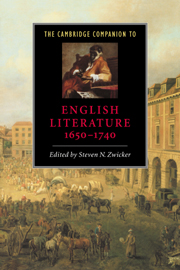6 - Lyric forms
from Part 1 - Contexts and modes
Published online by Cambridge University Press: 28 May 2006
Summary
The personal lyric, conceived as the expression of a highly individualized voice and subjective feeling, was not a major form between the early seventeenth-century flowering of the “metaphysical” lyric and the lyric resurgence of the late eighteenth century and Romanticism. From 1650 to 1740, England witnessed great social and political change, from the successive upheavals and reactions of the Interregnum, Restoration, and Glorious Revolution to the stabilizing consolidation of Whig constitutionalism, oligarchy, and bureaucracy. Profound economic and cultural transformations also occurred: a financial revolution, a growing commercial empire, and the increasing hegemony of a middle-class culture commercial in background and “polite” in aspiration. Traditional martial values (still crucial for England's foreign relations but tarnished by associations with civil war) clashed with aristocratic libertinism and middle-class ideals of civility. Men and women renegotiated their relations within the context of an increasingly prosperous, pacific, “feminized” domestic culture. Aggressively modern scientific and philosophical trends challenged the classics' still potent authority.
- Type
- Chapter
- Information
- The Cambridge Companion to English Literature, 1650–1740 , pp. 120 - 142Publisher: Cambridge University PressPrint publication year: 1998
- 3
- Cited by



